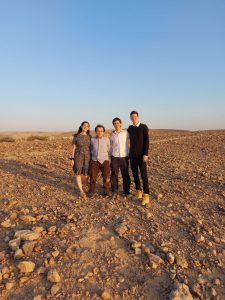Nicolas Galagovsky was born in Argentina and spent part of his childhood in the U.S. before making Aliyah with his family at the age of 16 to Be’er Sheva. Adjusting to life in Israel as a teenager wasn’t easy, especially given that COVID hit during his first year. He faced the challenges of adapting to a new education system, learning Hebrew, and then dealing with the disruptions brought on by the pandemic. Studying from home meant he missed out on social interactions that are part of a usual school day, which slowed down his language acquisition. Eventually, he enrolled in a pnimiya (boarding school), very common for Israeli teens, which provided a more structured and immersive experience.
Upon graduation, he went straight to Technion to study Aerospace Engineering, a field that perfectly blended his interests and future aspirations. Nicolas had always been passionate about cars, a love he shared with his father. From working on car models to watching motorsports, mechanical engineering fascinated him. Aerospace engineering, however, provided a path to combine this passion with a meaningful contribution to the army and potentially the Israeli Air Force.
The Atudah Decision
When it came to his military service, Nicolas had options. One was to join a hesder yeshiva, a path where most students continue into combat roles. However, he realized that combat wasn’t the best fit for him. Instead, he chose Atudah, a program allowing students to complete their degrees before serving in specialized army roles for a six year service. Additionally, it offered future career opportunities, sometimes even enabling participants to pursue a master’s degree during their extended service.
Nicolas had attended a small high school that didn’t focus heavily on college preparation, so he had to navigate the academic challenges largely on his own. Despite that, his love for math and science propelled him forward. In order to be accepted to Technion, he worked hard for his Bagrut (matriculation exams) and the Psychometry test, even taking the Yael exam just in case he needed it for Hebrew proficiency.
Life at Technion
Now in his third year, Nicolas has moved beyond the foundational courses in math and physics to more specialized aerospace studies, including fluid dynamics, thermodynamics, and airplane mechanics. The program is rigorous and entirely in Hebrew, though some professors teach in English. Despite the academic intensity, he enjoys the practical aspects of his studies, such as labs and projects.
As part of Atudah, he is gradually preparing for his enlistment. This semester, the army will introduce him to potential units and projects within the Air Force. He hopes to contribute to innovative defense projects, perhaps developing new weapon systems or aircraft technologies. This path is common in Nicolas’ program. Aerospace engineering at Technion attracts a high percentage of Atudah students—about a third —compared to other faculties. This reinforces the program’s strong connection to the military and future career opportunities.
Why Technion?
Long before making Aliyah, Nicolas had heard of Technion’s reputation as Israel’s premier engineering university. Its academic intensity and prestige, combined with being the only university in Israel offering an Aerospace Engineering faculty, made it his top choice. He saw the opportunity to study there as both a privilege and a challenge he was eager to take on.
A Strong Jewish Community at Technion
Adjusting socially was another challenge, but JLIC played a crucial role in making Technion feel like home. During his first year, there was no JLIC, and while he maintained his Jewish identity, he felt his religious engagement was stagnant. That changed when the Levines arrived and the JLIC Mizrachi

Nicolas and peers enjoying the first JLIC Israel Shabbaton to the Negev this past November
program began in 2023, bringing Shabbat meals, classes, Jewish events, and a sense of community. The JLIC presence not only deepened his connection to Judaism but also expanded his social circle.
Though Technion’s Jewish community is not large, it is strong and welcoming. The atmosphere is warm, and friendships form quickly. He has made many international, English-speaking friends through JLIC, and this complements the Israeli social connections he has made through his faculty. The social aspect of Technion, supported by JLIC, has enriched his university experience immensely.
Advice for Future Students
For those considering studying in Israel, Nicolas wholeheartedly recommends it.
“If you’re fresh out of high school or yeshiva and thinking about Aliyah, now is the best time to adapt to the culture, learn Hebrew, and build connections.”
Technion, in particular, is a melting pot of students from all over the world. Despite its rigorous academics, it fosters a sense of belonging.
“Also, antisemitism is not a concern on campus—you can freely practice your Judaism while engaging in top-tier education.”
His journey from Argentina to America, then to Israel, and finally to Technion has been filled with challenges, growth, and success. As he looks forward to his future in the Israeli Air Force, he knows that every step he has taken has been a meaningful part of his greater mission: contributing to Israel’s security while pursuing his passion for aerospace engineering.
